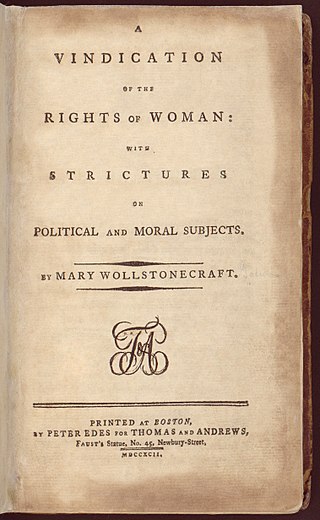
A Vindication of the Rights of Woman: with Strictures on Political and Moral Subjects (1792), written by British philosopher and women's rights advocate Mary Wollstonecraft (1759–1797), is one of the earliest works of feminist philosophy. In it, Wollstonecraft responds to those educational and political theorists of the eighteenth century who did not believe women should receive a rational education. She argues that women ought to have an education commensurate with their position in society, claiming that women are essential to the nation because they educate its children and because they could be "companions" to their husbands, rather than mere wives. Instead of viewing women as ornaments to society or property to be traded in marriage, Wollstonecraft maintains that they are human beings deserving of the same fundamental rights as men.

Susanna Blamire was an English Romantic poet, sometimes known as 'The Muse of Cumberland' because many of her poems represent rural life in the county and, therefore, provide a valuable contradistinction to those amongst the poems of William Wordsworth that regard the same subject, in addition to those of the other Lake Poets, especially those of Samuel Taylor Coleridge, and in addition to those of Lord Byron, on whose The Prisoner of Chillon her works may have had an influence. Blamire composed much of her poetry outside, sat beside a stream in her garden at Thackwood. She also played the guitar and the flageolet, both of which she used in the process of the composition of her poetry.
Jane West, was an English novelist who published as Prudentia Homespun and Mrs. West. She also wrote conduct literature, poetry and educational tracts.

Katherine or Catherine Philip(p)s, also known as "The Matchless Orinda", was an Anglo-Welsh royalist poet, translator, and woman of letters. She achieved renown as a translator of Pierre Corneille's Pompée and Horace, and for her editions of poetry after her death. She was highly regarded by many notable later writers, including John Dryden and John Keats, as being influential.

Elizabeth Bentley (1767–1839) was an English poet, one of a small wave of British and Irish writers from the labouring classes in the eighteenth century. She was a local poet who was nonetheless engaged with larger political and social issues.
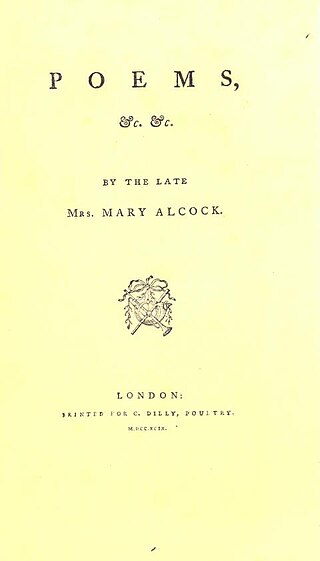
Mary Alcock was an English poet, essayist, and philanthropist. She was part of Lady Anne Miller's literary circle in Bath.
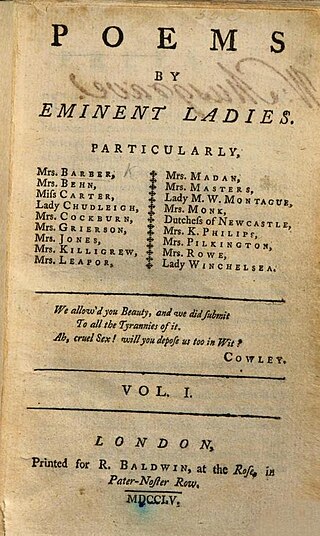
Mary Barber, Irish poet, was a member of Swift's circle. She has been described as "a domestic, small-scale, early eighteenth-century poet of charm and intelligence, but also an incisive, often satirical commentator on social and gender issues."

Constantia Grierson, was an editor, poet, and classical scholar from County Kilkenny, Ireland. She is notable for her achievements as a classicist, which were all the more remarkable given her labouring-class background.

Mary Scott (1751/52–1793), married name Mary Taylor, was an English poet, born in Milborne Port, Somerset. She wrote The Female Advocate (1774) in defence of women writing.
Mary Leadbeater was an Irish author and diarist.

Mary Collier was an English poet, perhaps best known for The Woman's Labour, a poem described by one commentator as a "plebeian female georgic that is also a protofeminist polemic."
Mary Darwall, who sometimes wrote as Harriett Airey, was an English poet and playwright. She belonged to the Shenstone Circle of writers gathered round William Shenstone in the English Midlands. She later explored subjects that included the nature of female friendship and the place of women writers.
Lady Eliza Dorothea Tuite was an Irish author and poet. She was a member of the Anglo-Irish gentry, the distinguished Cobbe family.
Sarah Cotter was an Irish printer and bookseller in the mid-18th century.

Frances Maria Cecilia Cowper, sometimes known as Maria Frances, was a religious poet and part of the Madan-Maitland literary coterie.
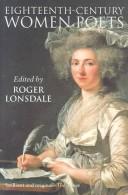
Eighteenth century women poets: an Oxford anthology is a poetry anthology edited by Roger Lonsdale and published in 1989 by the Oxford University Press. In the introduction, Lonsdale notes that while the featured writers may have flourished, to one degree or another, during the eighteenth century, by the time he came to collect their work, many of them had "disappeared from view." Scholars since have credited Lonsdale's "unprecedented" work for opening up new avenues for teaching and research. The collection comprises three hundred and twenty-three separate poems by one hundred and seven different poets, fifteen of whom remain anonymous. The entries are arranged chronologically, and each includes a biographical note.
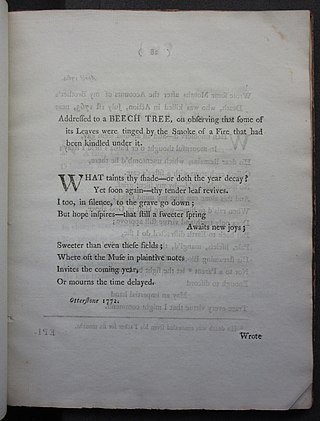
Christian Carstairs was a Scottish poet who published anonymously.

Elizabeth Teft was the author of a miscellany of occasional, topical, and political poetry. Although little is known of her life, her work has garnered scholarly interest.













